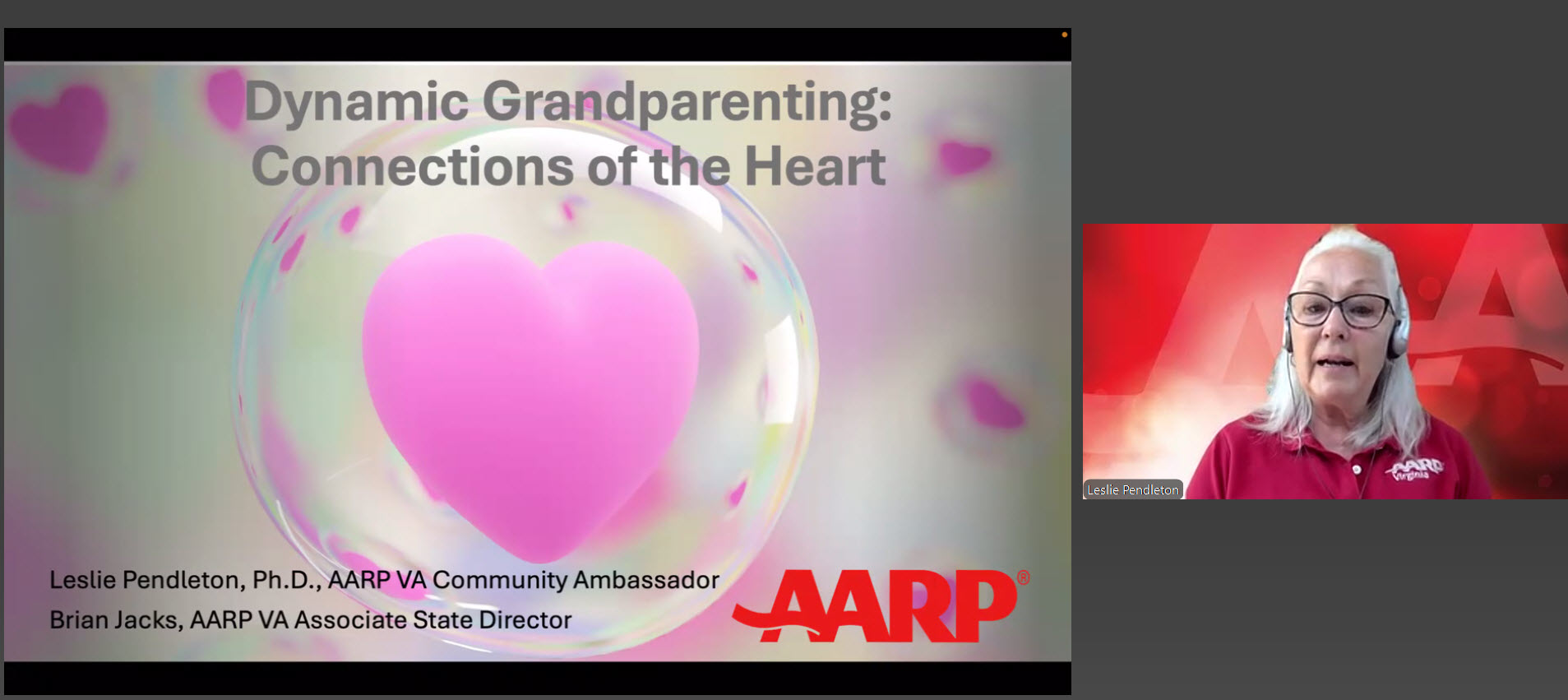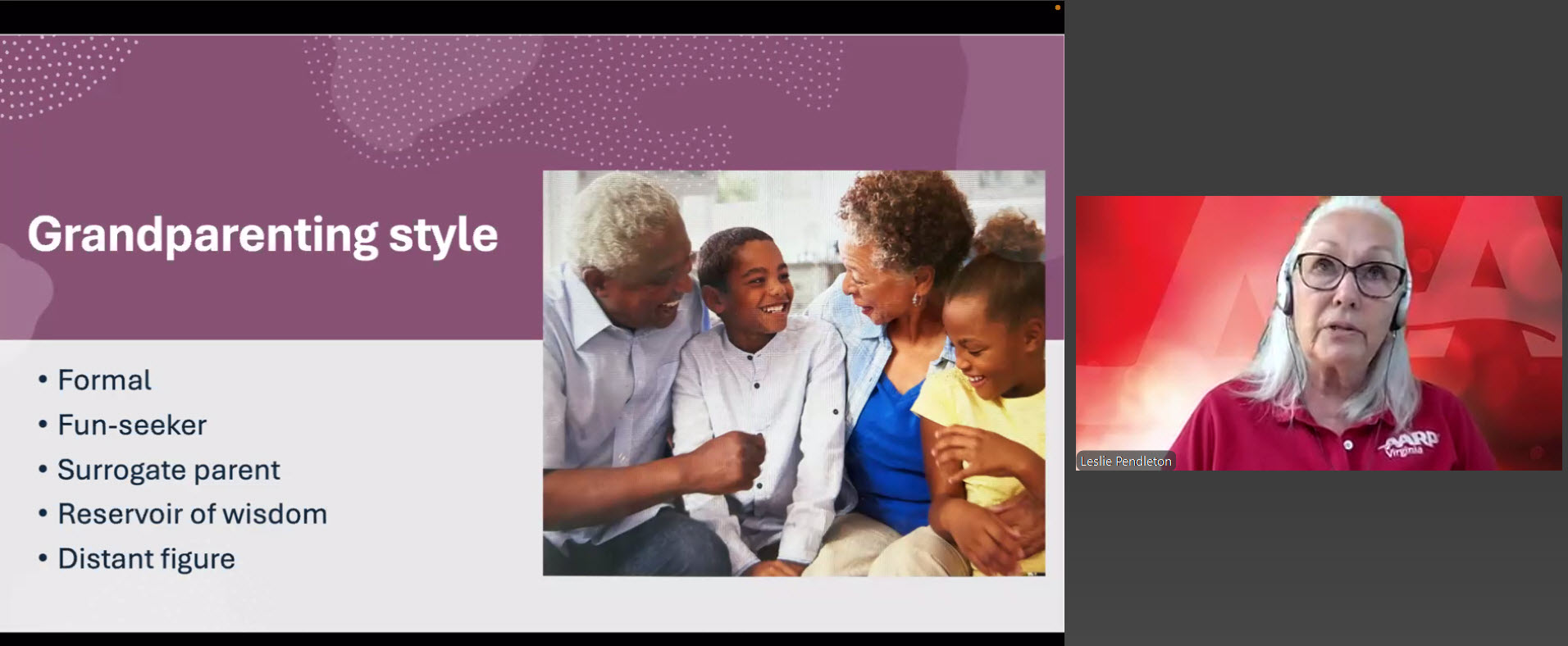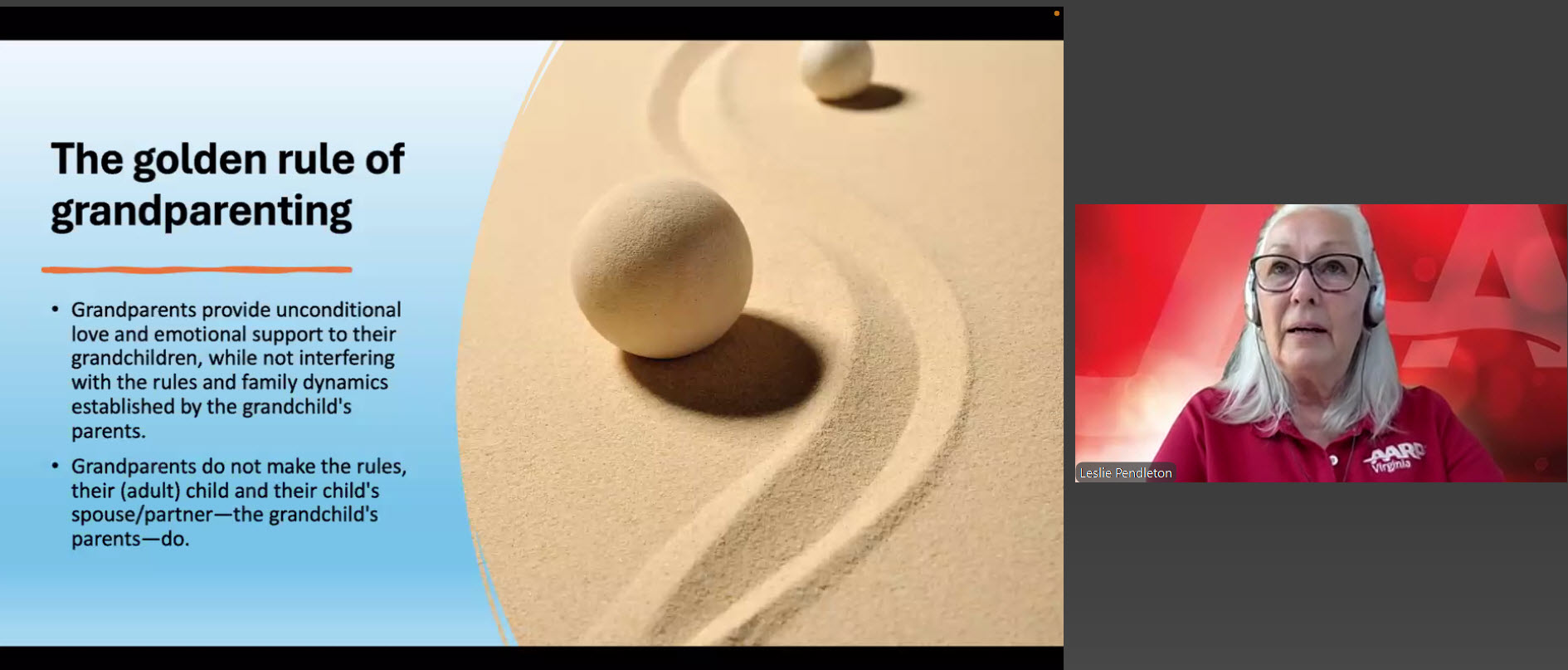AARP Hearing Center

What’s the golden rule of grandparenting? Provide unconditional love and emotional support to the grandchildren without interfering with the rules and family dynamics established by the kids’ parents.
That was the message Leslie Pendleton, who has a doctorate in counselor education, delivered during an AARP Virginia webinar titled “Dynamic Grandparenting: Connection of the Heart.”

Pendleton, a licensed counselor, listed four ways grandparents are important in the lives of their grandchildren: “The examples they set, the family history and life experiences they share, the love and support they give, and finally, the legacy they leave.”
She also emphasized “the importance of getting on the same page with the parents.” It’s critical for grandparents to respect the boundaries and rules set by their grandchildren’s parents, Pendleton told the approximately 160 people who attended the online event.

“The grandparents don't make the rules,” said Pendleton, a grandmother herself. “The grandchild's parents make the rules.”
The July 22 webinar, moderated by Brian Jacks, an associate state director for AARP Virginia, was part of a monthly series on grandparenting. The webinars, on topics ranging from “Musical Connections” and “Planning a Museum Visit” to “Making Holidays Memorable,” are available on AARP Virginia’s YouTube channel.
Pendleton, a Virginia Tech alumna and past president of the AARP New River Valley Chapter, discussed different grandparenting styles:
- The formal style. “A formal grandparent is probably not going to get down on the floor and play. They're not going to dance.”
- The fun seeker. “Most grandparents today have a goal of being a fun grandparent.”
- The surrogate grandparent – one who has primary responsibility for caring for their grandchildren.
- The reservoir of wisdom.
- The distant figure.

“The grandparents whose interactions I would say are less warm and maybe colder, maybe stricter – it's hard for them to engage at a level that the child enjoys,” Pendleton said. “When I think of my own grandparents, they were more on the formal side. I think grandparents have become more involved over time, and I think that's a good thing.”
She said her own style is to be a fun seeker.
“I can turn on disco music, and my granddaughter and I can dance, we can laugh, we can have fun together,” Pendleton said.
“You want to be known for something that’s unique when compared to the other grandparents. Develop your own signature style, your own trademark. You might be, for example, the grandparent who plays music, or the grandparent who ‘takes me camping,’ the grandparent who ‘takes me to church,’ the grandparent who ‘takes me out to hunt for bugs and frogs.’”
Pendleton said grandparents can help their children develop “good brain health” as well as emotional intelligence, empathy and communication and decision-making skills.
The activities for doing so will change as a child gets older, she said. Grandparents can talk or sing to an infant, read to toddlers and offer older children age-appropriate choices, such as asking whether they want raspberries or bananas.
Pendleton suggested asking grandchildren fun, open-ended questions: “If you wanted to make everyone on the planet smile, how would you do it? What is something that makes our family special for you? If you could have a superpower, what would it be?”
She also urged avoiding screen time during a child’s early years.
“When you're present with your grandchildren, it's important to engage in meaningful ways that minimize time spent on screens and devices and in front of TV. Learn how to balance the use of technology with all the other ways that you can be engaged,” said Pendleton, an avid gardener who enjoys traveling and camping. “I'm certainly a big fan of being out in nature.”
But there is an exception to the screen time ban: video chats with grandparents or other relatives. Such use of technology is important because 80% of grandparents live at least 50 miles from their grandchildren, and nearly half are more than 200 miles away, Pendleton said.
“One of the things that we do consistently is FaceTime. My husband’s granddaughter will be 4 in November, and it’s so sweet because she’s at the age where if she feels bad, she wants to call Pop-Pop. If something exciting happens – she caught a frog – she wants to call Pop-Pop. She probably does that at least three or four times a week,” Pendleton said.
“My granddaughter and I FaceTime usually once a week and sometimes twice a week. As she’s getting older, it’s happening more often.”
Pendleton offered this advice to older adults who don’t feel confident using FaceTime or other video-chat apps: “Ask your grandchildren to help you with the technology.”
Resources for grandparents
For more advice on grandparenting, Dr. Pendleton suggested:
- AARP’s Guide to Grandparenting
- Grandfamilies.org
- Early Start Neighborhood: The Grand Connector: Grandparent Resources
- Generations United
- The Long-Distance Grandparent































































